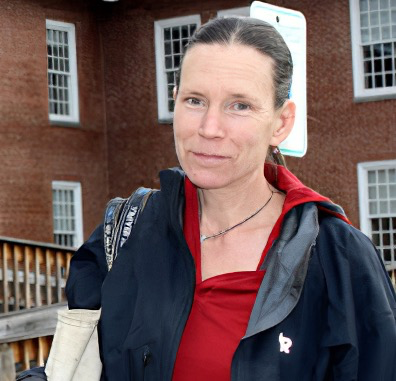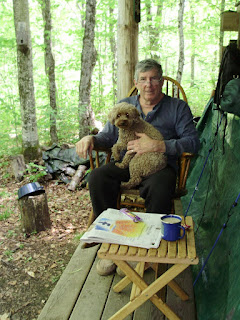 |
| Kris Pastoriza |
Leveling the Playing Field in Cell Tower Siting Disputes
A Conversation with Kris Pastoriza, Easton, NH Zoning Board Member
https://feeds.podetize.com/_WDh4gpSWD.mp3
Even if you have not listened to the NH Secrets episode about the proposed cell phone tower on historic Cone Mountain in Thornton, NH, you have undoubtedly heard tales of small towns embattled by armies of lawyers, consultants, engineers and others over a proposal to site a cell tower on a cherished spot.
Most people respond to such a proposal with the usual frustrated sense of powerlessness, resigned to the belief that there is nothing that can be done to halt the seemingly inevitable process.
But did you know that a town has the right to hire a land-use attorney and other engineers and consultants - paid for by the applicant?
Did you know that the town can require that the applicant cover the cost of maps, alternative site plans and other studies to verify - or refute - claims made by the applicant?
These are only some of the rights outlined in the Telecommunications Act that covers the rights and responsibilities of both the companies seeking to site a tower and the communities who will be affected.
Brief:
I am on the ZBA in Easton and was the one dissenting vote when the ZBA permitted a tower here.
A town has the right to hire their own lawyer and contractors to assess the cell tower applicant's data on propagation, real estate, height, wetlands, etc. The applicant has to pay for this. In Easton our contractor found that alternate sites we found had comparable propagation, and that the difference between propagation between 150' and 110' was barely discernible. When we received a proposed extension of the existing tower to 167', our contractor found that 167' did not have better propagation than 150' and the applicant withdrew their request for an exception for this height.
A town can also deny a permit for a tower if there has not been adequate search for alternative locations.
A town can also deny a height request, choosing more, smaller towers.
A town can deny a tower on aesthetic and historical impact.
A town does not have to consider cell service provided to other towns
A town just can't deny towers altogether.
All this of course requires a board willing to do the research and one that understands that the Telecommunications Act does not mean a board has to say yes. The cell lawyers are experts as misleading boards, intimidating boards, and sussing out how far they can be pushed and how well they can be manipulated. During the hearing for Easton's original tower, at the first meeting the cell lawyer said they would sue the town if they denied the permit. That set the tone for the whole series of hearings. The municipal lawyers towns get to represent them in these cases tend to be timid and not very helpful. They aim to avoid a lawsuit, not protect the residents from poor siting. Somewhere out there are aggressive and effective lawyers that know building code and municipal law.
In addition, the construction company is required to submit a list of the special inspections required for the tower. This is per the International Building Code, adopted by NH. They then have to submit third party inspection reports for all these inspections. Large towns with code compliance officers get these inspections, but many small towns don't, presumably to save the applicant money.
I've also heard that 5G is coming here soon, with 25' high towers, but more of them, so a provision for tower removal when alternative coverage exists, would be something to write into a permit.
Kris Pastoriza
Easton, NH
Transcript:
Kris Pastoriza: I began in the zoning board in 2015 and Northern pass started 2010.
Wayne: And when did the cell tower issue arise?
Kris Pastoriza: It came in just about when I started, so I might even have been brought in because they realized they had something coming and they needed someone extra to serve. I can't remember actually.
Wayne: And where the rest of the members, people who had been serving for a while?
Kris Pastoriza: Yep, they were.
Wayne: One of the principle problems with these kinds of proposals to cell tower proposals is just that, you have a group of volunteers who are in a position where they just don't seem to have the kind of support and political juice to take on these highly paid, whether they're lobbyists, or practitioners, lawyers. And you seem to have discovered that the boards have more authority than they know in general, through your research.
Kris Pastoriza: I think there's two things. I think they have more authority and more ability to say no than they realize. And they also, many of them don't know that they have a right to hire at the applicant's expense, their own lawyer, and that lawyer can deal with the applicant for them, negotiate prices, can advise the board on legal things, they can show up at the hearings, help the board, and if there is a permit issue, they can write that permit in a way that it's legally tight or however you describe it.
And the town also has the right to hire contractors of their own. Contractors can look at propagation of the tower at different Heights. They can look at propagation at different locations, do our environmental assessments. They could look at real estate values and they could look at [inaudible 00:26:31] or historical resources if the tenant has. So, the applicant has to pay for those and I think in Easton, we perhaps have got $10,000 of services. I don't know if that's an average figure, but part of the employer's job is to negotiate that for the town. That's the towns first level of enablement that they may not know about.
Wayne: Can you explain the concept of propagation?
Kris Pastoriza: Most people who apply, won't give the town a bunch of maps that will show in various colors, radiating from where they want to put their tower, how good the coverage is going to be. They might show three levels of coverage outside, in your car, in your house. They might show you a map showing coverage of their proposed tower and some other tower that they say they're going to have, or they do have, and that's to show you what they're offering, and also to show you the gap or there's no coverage. Their goal is to fill the gap and have complete coverage everywhere. Although gap is not actually ever been defined. So when they come in saying, they're allowed to cover the gap, you might want to define what gap is and use it to your advantage.
Wayne: So in other words, they come in and they don't say what the gap is? Or they do say what the gap is, but that's not necessarily the reality?
Kris Pastoriza: The lawyer for the cell company, His job is to convince you they have to have what they're asking for, and that they have every right under the telecommunications act to get what they're asking for and [inaudible 00:28:31] is a gap. The gap where there isn't service. The gap is why I they want to put a tower in your town, but there isn't a definition of gap. So, for a town that wants to have some control over the process, it would be helpful to look into how much gap is allowed, how much absence of service is acceptable. You know, you don't have to give them blanket coverage, at least not last time I looked at the documents.
Wayne: Well, in the case of Easton, for example, they proposed a tower of a certain height and you found that there are a lot of the additional footage was not necessary to fill the need that had been described. Is that a fair way to put it?
Kris Pastoriza: No, what really happens is they come in and they say, "We want 150 or 180." And that sort of sets people's mindset for what is really needed. So it's like a bracketing. So you'd feel pretty strange to go and say, "No, we're only going to give you 110 feet." Because that seems so much less than they asked for. But when you look at the propagation map for Easton, for example, the difference between 150 feet and 110 feet, you can barely see it on the map.
So, they should have been given 110 feet and been fine. The second consideration is, how many carriers are on that power? You want to give them 150 feet? Get your four carriers on the tower and have fewer towers. Do you want to give them 110 feet? Then maybe there's only two carriers, and then they say they need to put a tower somewhere else. That's one of the decisions that's commonly outlined in that help manuals. You want taller fewer towers or more shorter towers. I think most boards tend to kind of compromise, give them a little less than what they're asking for. So you can feel like you've accomplished something.
And I think that's what Easton did. We gave them 130 feet, rather than 160 feet.
Wayne: Who creates the propagation maps themselves?
Kris Pastoriza: Well, their applicants tend to submit their own and we hired a engineer to do one for the town. I think it's pretty much all computer modeling, I don't think they have to go anywhere, travel to do those, just the computer, simulation.
Wayne: So, that's an expense that the town can recoup from the applicant if they choose to have their own modeling maps done?
Kris Pastoriza: Yes, and you can also have them done for different locations. The applicant has to prove they've done a site search that they've looked at a bunch of places and that the one they chose was the best. So if they just come in with one site, because it happened to be something that was convenient for them or owned by a friend of a friend, that's not good enough to have to show site search. So our applicants had only submitted the one location. So when we hired our engineer to go out, he did not only different Heights of the tower, but covering different locations. His parcels in the town that we asked them [inaudible 00:32:33]
Wayne: So, a town that had no experience at this, it would be very easy for an applicant to essentially come in with their own maps and suggest that the town already had its own legal counsel that could handle the legal questions without hiring anyone else, they could essentially kind of provide a snow job to the board.
Kris Pastoriza: That's the job of the cell tower companies lawyer. That's their job is to, mislead you about the telecommunications act, make you feel you have to say it, make you feel you have to give them what they want, and to fight you every inch of the way. I think very good at their job, they're very good at sensing when a board is going to resist, when the board is afraid, when the board knows things, when a board doesn't. I think it's the job of the town's lawyer, if they know enough to hire one, to fight that. But I've not seen a municipal lawyer with those sorts of skills to oppose the aggressiveness and manipulation that the cell tower lawyers use against the board.
Wayne: Now, during the Northern pass battle, you experienced some pretty good land use lawyers representing the folks from Northern pass. Were there any of those that you think might live up to that challenge?
Kris Pastoriza: I think any lawyer, and maybe even any person who simply educated themselves in telecommunications law and learned how these cell tower lawyers operate, would be able to deal with them without any trouble. I don't think they're particularly sophisticated people. They've just been operating against the group of vulnerable people. That's why they're so successful because they've had an unfair advantage.
Wayne: So your advice to towns that are facing these kinds of applications now is to arm themselves with a better understanding of the telecommunications act, and understanding of their rights under the law, with respect to the applicant?
Kris Pastoriza: Yeah. And understand that they can say, no. They just have to have a reason for saying no. And they can deny permits blankets, they just have to provide a good reason. And they may have to be willing to have a lawsuit with the applicant, certainly our applicant at the first meeting said, if they didn't get their permit, they'd sue us. I don't know if they were going to sue us if they didn't get the permit, but that was part of the game. So, that might be a possibility, but I like to think that if more towns were ready to take on the companies and risk a lawsuit, then there might be some precedent for something other than towns being exploited by the cell company.
Wayne: Right. So, the playbook for these companies is to bring out the boogeyman of the lawsuit right away to try and intimidate the town?
Kris Pastoriza: It was for us. Another town that was more sophisticated, they might take a different strategy.
Wayne: Right.
Kris Pastoriza: I've looked through a lot of notes from other towns to see how they dealt with it and even with the same lawyer will have a very different approach depending on whether the account was educated and forceful or not. [inaudible 00:37:10]
Wayne: Interesting. Were there any towns where you saw particularly good examples of them being able to stand up for what they needed to in the process?
Kris Pastoriza: There were and I'm sorry that I can't remember the name, but I can get it [crosstalk 00:37:35] where they say from the start, "We understand that we can say no. We're not obliged under the telecommunications act to do whatever you want." We get three or four people on board that knows that [inaudible 00:37:49]
Wayne: Was there any, in Easton, was there any discussion about simply improving existing towers to provide the necessary services? Or was that not possible?
Kris Pastoriza: The closest towers were over on the other side of [inaudible 00:38:12] which obviously was not going to offer us coverage and one in Franconia. So there was really no question of somewhere else they could put their antenna on.
Wayne: I see. Yeah.
Well, Kris, I thank you very much for taking the time to talk with me about this. I think it will be very useful, particularly for smaller towns to hear what you have to say about this and perhaps they can arm themselves with a little more information and seek out the counsel that they need and are entitled to. So that in future cases, they're not run over rough shot.
Kris Pastoriza: I hope so.

















